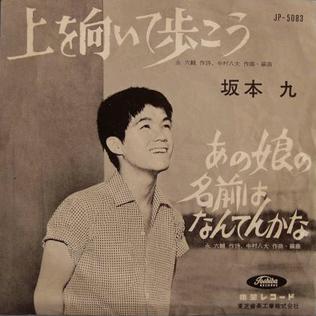
Sukiyaki (song)
"Ue o Muite Arukō" (Japanese: 上を向いて歩こう, "I Look Up as I Walk"), alternatively titled "Sukiyaki", is a song by Japanese crooner Kyu Sakamoto, first released in Japan in 1961. The song topped the charts in a number of countries, including the U.S. Billboard Hot 100 in 1963. The song grew to become one of the world's best-selling singles of all time, selling over 13 million copies worldwide.
"Ue o Muite Arukō"
"Sukiyaki"
"Ano ko no namae wa nanten kana"
15 October 1961
1961
3:05
- Toshiba-EMI (Japan)
- Capitol/EMI (US and Canada)
- HMV/EMI (UK)
Kōji Kusano
Composition[edit]
"Ue o Muite Arukō" (pronounced [ɯe o mɯite aɾɯkoꜜː]) was written by lyricist Rokusuke Ei and composer Hachidai Nakamura. The lyrics tell the story of a man who looks up and whistles while he is walking so that his tears will not fall, with the verses describing his memories and feelings. Ei wrote the lyrics while walking home from participating in the 1960 Anpo protests against the U.S.–Japan Security Treaty, expressing his frustration and dejection at the failed efforts to stop the treaty. However, the lyrics were purposefully generic so that they might refer to any lost love.[3][4]
The English-language lyrics of the version recorded by A Taste of Honey are not a translation of the original Japanese lyrics, but instead a completely different set of lyrics arranged to the same basic melody.
English title[edit]
In Anglophone countries, the song is best known under the alternative title "Sukiyaki", the name of a Japanese hot-pot dish with cooked beef. The word sukiyaki does not appear in the song's lyrics, nor does it have any connection to them; it was used only because it was short, catchy, recognizably Japanese, and more familiar to English speakers. A Newsweek columnist compared this re-titling to issuing "Moon River" in Japan under the title "Beef Stew".[6]
Well-known English-language cover versions with altogether different lyrics often go by the alternative name or something completely different, including "My First Lonely Night" by Jewel Akens in 1966, and "Sukiyaki" by A Taste of Honey in 1980 (see below). The song has also been recorded in other languages.
Commercial performance[edit]
In Japan, "Ue o Muite Arukō" topped the Popular Music Selling Record chart in the Japanese magazine Music Life for three months, and was ranked as the number one song of 1961 in Japan.
In the US, "Sukiyaki" topped the Billboard Hot 100 chart in 1963, one of the few non-English songs to have done so, and the first in a non-European language. It was the only single by an Asian artist to top the Hot 100 until the 2020 release of "Dynamite" by the South Korean band BTS.[7] "Sukiyaki" also peaked at number eighteen on the Billboard R&B chart,[8] and spent five weeks at number one on the Middle of the Road chart.[9]
Sakamoto's follow-up to "Sukiyaki", "China Nights (Shina no Yoru)", charted in 1963 at number 58. That was the last song by an artist from Japan to reach the US pop chart for 16 years, until the female duo Pink Lady had a top-40 hit in 1979 with its English-language song "Kiss in the Dark".[10]
Internationally, the song is one of the best-selling singles of all time, having sold over 13 million copies worldwide.[11][12]
Legacy[edit]
An instrumental version of the song was played by NASA over the radio for the Gemini VII astronauts as mood music, thereby becoming one of the first pieces of music sent to humans in space.[22]
On 16 March 1999, Japan Post issued a stamp that commemorated the song.[23] The stamp is listed in the Scott Standard Postage Stamp Catalogue as Japan number 2666 with a face value of 50 yen.
In the wake of the 11 March, 2011 Tōhoku earthquake and tsunami, the Suntory beverage company released several commercials that included this song (as well as "Miagete goran yoru no hoshi o"), with 71 actors and singers singing parts of the song, followed by the title caption "ue wo muite arukou", roughly translated as "let's walk with our heads up", as a way to motivate Japanese people to "keep moving forward towards tomorrow", giving a message of hope.[24][25][26] This song was also heard in the Studio Ghibli film From Up on Poppy Hill of the same year.[27]
On October 15, 2020, Google honored the song and singer Kyu Sakamoto with a Google Doodle.[28]
In the summer of 2021, the song was performed in remix during the closing ceremony of the 2020 Olympic Games in Tokyo (which had been postponed due to the COVID-19 pandemic).
"Sukiyaki"
"Don't You Lead Me On"
March 1981
1980
3:44
- Hachidai Nakamura
- Rokusuke Ei
- Janice-Marie Johnson (English lyrics – uncredited)
George Duke
6 September 1994
2:42
- Hachidai Nakamura
- Rokusuke Ei
- Janice Marie Johnson (English lyrics – uncredited)
- Mauro P. DeSantis
- Jerry Melillo
13 April 2018
2018
4:18
Viscount Music
- Hachidai Nakamura
- Rokusuke Ei
- Janice Marie Johnson (English lyrics)